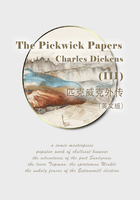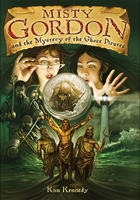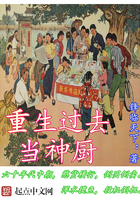The Last Day of Christmas, 1641
It was January 6th of the year 1641, being the last of the twelve days of Christmas, and my fifteenth birthday. My godmother, my Aunt Moulton, had travelled in her own coach from Honeybourne in the County of Worcestershire to pass Christmas at our noisy house (then hung in every nook with holly and ivy); which was the Manor-house of Forest Hill, a little town lying distant from the City of Oxford not above four miles by road, to the eastward as you ride out beyond Headington Hill. She came to me that morning where I sat in the great parlour with my brothers and sisters—for outside it was snowing plentifully—and "Here, Child," says she, "here's my annual gift to you; I had almost forgot."
I sprang up, my cheeks smarting from the blaze of the fire, and made her a low curtsey, for though I had already so saluted her twice or thrice that same morning, she was a gentlewoman whose bearing naturally demanded a ceremonious exactness from children; besides, a birthday gift from my Godmother Moulton was always worth a dozen of curtseys, she would choose it so judiciously.
When I pulled off the paper wrappings I found a book, of middle size, bound in fine white vellum, with a silver clasp that had a lock to it and a little silver key. The title was stamped upon the cover in gold letters: "Marie Powell: Her Book." My younger brothers and sisters crowded round me, and Zara who was next below me in age cried out, very unmannerly: "Let me look! Let me look! Oh, let me unlock this thing and see the painted pictures!"
My brother James, who was next in age above me, and an undergraduate of Christ Church, pulled her away and "Patience, Zara," says he, "your birthday falls not until September. This is Marie's own day: to-day she is all and you are nothing." Thereupon the turbulent children fell back a little while I unlocked the clasp.
I opened the book at the title-page, as I thought, but the paper was wholly blank, as likewise was every new page that I turned over; which at first dashed me out of countenance, though I tried to hide my disappointment from my Godmother Moulton. She took my face between her hands, whereon were white worsted mittens and a great beryl ring of silver-gilt, and kissed my brow. Then she said: "Godchild, I hope you'll take kindly to this gift of mine, which the Queen's own stationer has bound. For I reasoned that by now you would have quite wearied of the Seven Champions of Christendom and the Morte d'Arthur and such-like old papistical tales of slaughter and magic, which were your constant entertainment when last we met together; but, further, that you would not yet be grown to an age when the gift of a good book of sermons would content you. Then I remembered your lively fancies and inventions, which indeed are proper to a child born, as you are, under the capering sign of Capricorn, and on Twelfth Night too, when the stars seem to dance running-battle in the sky. Said I to myself: 'Let the child write her own book, this New Year; but I'll fasten it with a clasp and lock, so she may keep it private from her meddling brothers and sisters. She shall wear the key on a ribbon about her neck.'"
My Godmother's notion, when it was dressed out in this fashion, charmed my mind. I stammered in my thanks, which she knew for sincere, and presently with a smile she cried: "Children, God bless you all! I must go and put on my bravery!" With that she withdrew herself into the little chamber over the kitchen, where she always lodged because it was the warmest, though the window looked out upon the wood-yard and the stables, rather than upon the orchard and gardens. After she was gone, my younger brothers, John and William and Archdale, who were lumpish, mischievous boys and hunted together in a howling pack like beagles, closed upon me again with "Let me see, O, let me see!"
I assured them there was nothing to see but white paper and handsome covers; so presently they went back to the fire, where they were playing some idle game with hazel-nuts. Only William stood fast, and says he: "Sister Marie, won't you write a tale of warlocks and witches in your new book, and won't you read it out to us every Saturday at evening, chapter by chapter? You are the best one at the telling of tales in this whole town. Or won't you write out a history of Knights and Squires and Ogres in the brave old days?"
I did not answer him for awhile, for though his little petition flattered me, it did not jump right with what my Aunt Moulton had put into my mind, of keeping the contents of my book private to myself only.
"No," said I at last. "There's no need. I can read tales in the flames of the fire as I sit on my stool before it; so the fire's a better book for your purpose than this would be. You shall have a tale to-morrow about Mother Grime, the Witch of Wheatley, who lived there in the days of King Harry—how she put a curse upon the bells in the bell-tower to prevent their ringing. That's a firm promise."
"And did she grease her broomstick with adder's fat to make it fly the faster?" he asked.
"Phoo, that's nothing," said I, laughing. "Witches always grease their broomsticks with adder's fat or viper's, even the least cunning of them. Mother Grime was no common witch; she would tie three knots in the tail of the little badger-dog, her familiar, to make him invisible and give him a soundless bark."
"Did she brew hell-broth in a great brazen cauldron? Did she throw in toads and puddocks and dead men's fingers and the soot of sea-coal?"
But I told him he must wait until the next day if he would hear the right manner of brewing hell-broth according to Queen Hecate's own receipt and practice. Then Zara, who was at that time a spiteful little wretch, always plaguing me, crept up again and, says she, pretending innocence: "Sister, will you indeed confide your whole heart and mind to the book? Will you write out in plain words what that little scholar of Magdalen Hall, Gregory What's-his-name, proposed to you on Christmas Eve when you were sliding on the ice, and what answer you made him? Will you also copy into it the letter, perfumed with musk, that he slipped into your hand as we went walking towards—"
At this I brought down the book on Zara's skull with a hearty thump and laid her flat among the rushes. Then I gathered up my skirts and ran from the room, lest any new riot might delay my enjoyment of the happy fancies that now crowded me.
I went first to knock at the door of my father's little study, which was also the linen-chamber, where he sat casting his accounts. He worked by candlelight, the whole heaven being dark with snow. Presently he pulled open the door, the handle of which was ready to his hand, and I showed him my gift, that pleased him mightily. We conversed awhile and soon I was bold enough to beg a bundle of goose-pens, an ink-pot and a sand-caster; which he denied me at first. However, I pleaded my birthday and Twelfth Day kindness; and also gave him leave to write something for himself on the title-page, which I could see that his fingers itched to do. To tell truth, I shrank from the hazard of smudging a clean book; moreover, I loved my poor father well and was content that he should write something for me in his own hand. So in return he gave me all that I asked.
When he enquired how I proposed to fill the pages, I put him off by saying that my brother Will had petitioned me to write down tales of the brave old days of Robin Hood and Sir Launcelot du Lac, to read out before the fire every Saturday, at evening before supper. At this my father gazed fixedly on me for awhile and then with a sigh that had something prophetical in it, "Marie, my dear," says he, "I'll acquaint you with something to the purpose. These are the brave old days, as no others ever were. Write of them, if you will, and let the record be a solace to you in the sad new days that I fear must soon break upon us with the present alteration of the King's affairs."
He took up a pen and trimmed it well with his pen-knife and then thrusting aside the candle-sticks to give him more elbow-room for his task he very exactly inked me out a lozenge figure on the title-page of the book. In the lozenge he set the arms of Powell, which are a chevron (or roof-tree) argent on a sable ground, with two bloody spear-heads above and one below—"gutty de sang" is the heralds' cant for the gouts of blood on the spear-heads. For want of vermilion colour, he painted the gouts with blood drawn from his own thumb, which he pricked with the knife to show his earnest affection for me. Next, he wrote a flowing M, and a flowing P, at the outward point of the lozenge, and below it set the day and the year, and at the foot of the page in fine Italian writing:
"These Were the Brave Old Days,"
saith Richard Powell.
With that, he kissed me and bade me begone, since he had now four times miscast the same crabbed reckoning of moneys.
This then was how the book came to me, and how I began to keep a record of my maiden days at Forest Hill, which (as it seems to me now) were truly the brave old days, as no others can ever again be. For this was to be the last year of peace in England, before the bloody Troubles arose which cast us Powells, with many thousands of other light-hearted, loyal and well-to-do families, into the lamentable black mire of delinquency and ruin.
After dinner that day, when eleven invited guests (besides our household of sixteen) sat down to table, began the customary merry-making of Twelfth Night, to which numerous persons of quality, our neighbours, came in their coaches or on nags from all the country round, so far as Thame and beyond: for we kept Twelfth Night more gaily than any other house thereabouts, upon account of my birthday. They came masked and dressed in very rich clothes, or in such grotesque disguises as the skins of wild-beasts, or the foreign garbs of Turks or Jews or Chinamen; or they assumed the characters of rufflers or fools or antics or astrologers or country sluts, disguising not their persons only but also their voices. The Lord of Misrule who controlled the festivity, that otherwise might have run out of hand, was my brother Richard, the eldest of us all, whose profession was the Law. To him all the company must formally bring their charges if they saw through any masquerade, saying that it concealed such and such a person. Then the Lord of Misrule, advancing his long black rod, would march up to the accused masker with: "Sir (or Madam), you are accused to me by this credible witness to be Such-and-Such. Do you plead guilty, or do you plead not guilty? Signify your plea either with a nod or with a shake of your head."
A masker that pleaded guilty was straightway ordered to unmask and pay a forfeit; but if he pleaded "not guilty" with a shake of the head then the accuser himself paid the forfeit unless, pleasantly giving the accused person the lie, he challenged him to discover himself. Then the forfeit would be doubled, falling against the party that was proved to be at fault. Between ladies and gentlemen the customary forfeit was either a kiss or a grovelling abasement; and one gentleman piercing the disguise of another might give him a stroke with the open hand upon his forehead; or he might smudge his nose with charcoal, or gently tug his beard; but if upon the unmasking he proved to be mistaken, then the other might kick his buttocks for his pains. Yet by an ancient law of Misrule, no woman might lay accusation against any other woman; which was wisely contrived, I think.
Our good friend, Captain Sir Robert Pye the Younger, of Faringdon Magna in Berkshire, came disguised as a country-carrier with a smock and whip, his cheeks well smeared with ruddle. My little brothers were tricked out as apes, capering about together and each officiously catching fleas for the others, but since they were all much of a size and shape, it was hard to tell this one from that. Little William won a forfeit on account of false accusation from Provost Tolson of Oriel College, who mistook him for Archdale; and elected to smudge the Provost's face for him with charcoal, which he did with the letter S upon each of his cheeks. The old gentleman, thinking these to be simple smudges, joined in the laughter against himself, until in the little silver mirror which I showed him, he saw himself branded as a Stirrer of Sedition; whereupon a sort of horror overcame him and he wiped off the ignominy with spittle and the sleeve of his gown.
My mother counterfeited an aged and meek nun, which she did to the life. Her cheeks were chalked, her eyes downcast and her voice quavered as she clicked her poor cherry-stone beads; but the character that she assumed contradicted her nature point-blank, for my mother is a hearty, jolly, managing woman and by no means frequent in her devotions. Before long, upon a drunken gentleman's wagering that she was in truth but a sinful old baggage and that she lay every third night with the Devil, she could not refrain, but burst into her familiar baying laugh and so was discovered. Then a gentleman disguised as the Devil, with hoofs and horns and a goat's beard, laughed more heartily yet; whereat he was immediately accused to the Lord of Misrule of being my father; so the waggish gentleman had knocked down two birds with the same stone. Then the little apes, my brothers, swarmed into my mother's lap, making as if to tear her rosary from her, and "By Sulphur and Brimstone, Nan," the Devil cried to the Nun, "haven't I begotten a brave horde of devilkins upon your dainty body?"
Zara was dressed as a Spanish lady of quality, in fine clothes lent her for the occasion by my Godmother Moulton. Her bodice was of yellow satin richly embroidered; her petticoat, of striped gold tissue; her robe, of crimson velvet with a raised pile and lined with white muslin that was spotted over with stars. My godmother had brought these clothes with her for me to wear, but I had outgrown their measure; whereby Zara had the profit of her kindness.
As for myself, I dared that night to assume man's clothing: I affected to be a modern goddame blade, wearing a tall ribboned hat, with a narrow brim and a great plume caught at the ends with silver ribbon, and carrying a frosty-blue cloak over my arm, lined with white. I had fine Greek lace at my wrists and neck, and a tight doublet of willow-coloured satin, very short in the skirt, with breeches of the same colour, shaped like organ pipes, and ornamented at the knee with many dozen of points. The feet of my boots were two inches too long and their lace-fringed tops were terrible large, being turned down as low as my gilt spurs, that jingled like bells of a morrice-dancer. I carried a cane in my right hand, with which I toyed as I straddled down the hall; keeping my two feet wide apart, like a child at his first steps, lest the rowels of my spurs should catch in the lace and overset me. I also wore a little sharp artificial beard at which I plucked carefully, lest it came away in my hand, and fine fringed gloves scented with musk; and I made legs and bows instead of curtseys. My cousin Marmaduke Archdale, who was afterwards slain in the King's service, during the siege of Gloucester, had procured these masquerade clothes for me from a young courtier of his acquaintance; my cousin being always very attentive to my petitions.
That I could so indulge my fancy, though now a marriageable girl, and that I ranged myself in the dances with the gentlemen, and that, when I was at last accused and unmasked, my parents were not vexed with me, nor nobody scandalized, but that all was taken in good part as a Twelfth Night prank—all this, I think, fairly shows both my particular bold spirit and the general kindness of the times. None who was admitted to our house was ever allowed to feel ill at ease in it, unless he were some felonious prisoner that the town-constable hauled in to be tried by my father, who was a Justice of the Peace; or else some snuffling Puritan tradesman, come on an errand, who often by the freedom of our speech must have thought himself in Babylon or Bantam. Only my Aunt Jones of Sandford, my father's elder sister, who was a backward-looking gentlewoman and came to our masquerade wearing her ancient open-breasted grey gown, with her usual starched ruff, and her ancient velvet hat like a wind-blown balloon—only she spoke some few slighting words against me to my father. She asked, pointing rudely at me with her finger, how he hoped that any discreet gentleman with an eye to marriage would choose such stale goods as those?
My father answered that this was Twelfth Night, and that if she uttered more scurrility he would accuse her as a spoilsport, and then the Lord of Misrule would put her to the ordeal of squibs and firecrackers; whereupon she begged his pardon and said no more. My Aunt Jones has ever had an extraordinary sneaking countenance and way with her.
In an interval of dancing, as was my privilege, I cut the great Twelfth-cake, which was rich with raisins, plums, ginger, honey and pepper, and frosted over with Barbary sugar; in the middle of it stood a coloured sugar-work of a wood-monger's wain, heaped with cut timber. There were also various fruits set here and there upon it, as apples, lemons, oranges, citrons, pears, plums, all of sugar and in their colours scarce to be discerned from the natural. Being grateful to my Godmother for my gift, I saw to it that the slice of cake came to her in which the fortunate bean was hidden; for I had been in the pastry-room while the cake was being prepared for baking and had marked the very spot. She drew out the bean with a cry of joy, like a child; and when she was acclaimed and crowned Twelfth Night Queen she chose my brother James as her King and myself as her Page. The Lord of Misrule was her Grand Chamberlain.
As Queen, my godmother laid divers witty obligations on her courtiers. In particular, she instructed Sir Robert Pye to stand before her and preach in celebration of the Divine Right of Bishops. My father protested that she was shearing this sheep a thought too close; for, as we all knew, Sir Robert was of the same Presbyterial way of thinking as his father, Sir Robert Pye the Elder, Member of Parliament for Woodstock; which Parliament was determined upon removing the Bishops, root and branch, from their places of power about the King. My father would not, for the world, see any of the Pyes offended, to whom he lay under an obligation of gratitude for a timely loan of money.
However, Sir Robert was no mean little wretch, but a knight of generous mind, and, speaking in the character which he represented, he swallowed (as the phrase is) bait, rod and angler too. For he extolled the Bishops in a highly ironical manner, likening them to busy country carriers, who, not content with the management of their horses and of the merchandize entrusted to their care, will make it their business to listen to all manner of piddling talk in the courtyards and ale-houses of their circuits, and will pump old gossiping women, their passengers, for scraps of parish history. He swore that these spiritual carriers, the Bishops, had become by this traffic in news so very-very knowing and enlightened as to be worthier Lords, or Esquires, of the places where they were but licenced visitants, than the uninstructed laymen who ruled there by mere hereditary right.
This speech vexed two splenetic University Doctors, Dr. Browne and Prebendary Iles of Christ Church, who were hot Prelatists and rightly guessed that Sir Robert was drolling against the Bishop of Oxford, Dr. Bancroft, who had lately in a visitation of Woodstock pried somewhat too closely into the affairs of Sir Robert's father. They pulled their gowns tightly about their shoulders, looked budge, and glowered, and Dr. Browne muttered that there were some Christmas Pyes that made his belly ache.
At this my brother James, turning to his Queen with a frown, said aloud: "Madam Queen, there sit two sour-featured subjects of ours who must be reminded of their allegiance!" Which bold observation was well received by the company. James fixed their sconce, or fine, at half a gallon of Scotch ale to be drunk between them "to the health of the Blue Bonnets"; meaning the anti-prelatic Scottish Covenanters who had come out in arms against the prayer-book that our Archbishop Laud would have forced upon them. This sconce the Doctors dared not refuse; besides, they knew that our Scotch ale, the brewing of which I had myself overseen (tunning it in a sweet-wine barrel) was nappy and good beyond the ordinary.
When I brought them the pot to drink, they muttered the required words, but with the saving addition of a prayer that these same Blue Bonnets might presently turn blue all over, from snout to rump, for the peace and security of both Kingdoms. This drew a general laugh, which restored them to better humour. They drank up, turn and turn about, and the ale worked on them so powerfully that they blinked like owls and soon forgot the cause of their punishment.
At about half-past nine, very unseasonably, while we were at supper, came a knock at the door and when it was opened there stood the parish constable, a burly fellow, having a poor man fast by the collar.
The constable asked: "Is his Worship the Justice at home? Has he leisure to commit this felon? I have the necessary witnesses here to swear a charge against him for attempting a robbery."
I had gone to the door, and spoke up, saying: "S'death, Mr. Constable, we have no time for any such ordered sublunary justice here to-night. Know you not that this is the season of perfect Misrule?"
Yet the constable would not take the man away, and protested that the town-jail had no lock to it, from the negligence of our carpenter, and that the villain would doubtless escape away. He begged that the Justice would commit him to some secure place for the night. He continued stubborn in this, and the accused man, drawing courage from the word Justice, cried out too: "Ay, justice, give me immediate justice! I am no felon but an honest man from Noke parish who have lost my road and my horse in the snow, and must return in haste to my wife's lying-in."
A servant acquainted my father with this plea, who replied: "Let the constable bring the prisoner and witnesses to me in the little parlour. Instruct the Clerk of the Peace to be present with a prepared mittimus and whatever else he may consider necessary." Then he turned to Sir Robert and "Cousin," said he, "come with me into the parlour and you shall see sport!"
My father borrowed from another masker his long black visor-mask and pulled it over Sir Robert's head. About the same time the Clerk of the Peace came running in from the kitchen, dressed in a suit of black serge with white bones painted on it, and a skull mask, very horrible, over his face. "Give me leave, your Worship," he cries, "to go home and change this disguise for my formal dress."
"Never a bit of it, Mutton-bones!" replies my father. "We must carry this business through in proper style. Be as you are."
The constable led the supposed felon into the little parlour, and he was indeed an honest poor man, one John Ford from Noke parish (which lies a few miles from us along the Worcester road) and my father knew him. He had been thrown from his horse in the snow and was crawling to take shelter in a fowl-house near by, when he was observed by two men, one of whom caught and held him, crying "A robbery, a robbery!" while the other man ran to seek the constable.
The witnesses, bewildered by the many lights and all the hubbub, followed behind and when they entered the parlour, Lord, what a sight was there! The Devil himself, his face smeared with yellow—there is very good yellow ochre dug from a mine on Tyrrell land at the edge of Shotover Forest—the Devil, I say, sat there before them on a chair of state hung with primrose-yellow silk. Beside him glowered a tall grim fellow with a black visor, holding a drawn sword in his hand. At the table a skeleton played with pen and ink, and three little apes squatted on a chest behind, scratching themselves. The candles were shaded with red paper, which cast a hellish glow on the scene.
Of the sequel I cannot speak certainly, for I was not present in the parlour, and my father never omitted to embellish a good tale; but it happened something after this manner.
The constable, who knew of what a fanciful spirit my father was sometimes possessed, held his ground, though a little astonished, I dare say; but the poor man from Noke turned pale and cried out: "O Gentle Satan, your Worship, I have a clean conscience, I swear I fear you not, I defy you! I am no felon, I am John Ford, a poor goose-herder, who never in his life willingly injured any man, and comes of honest parentage."
"Ha, ha, John Ford," quoth the Devil, neighing like a horse, "you speak me fair. But beware lest I catch you, for I know a thing or two standing against your account which, if you do not make amends, will lead you direct into the hottest part of my bonfire."
"That I promise to do, good your Worship," said the poor man, blubbering—for the chance shot had struck home—"to-morrow at the very latest, though I have to sell my wife's gold ring to raise the money necessary."
"Now, for this other matter, tell me, where are your accusers?" the Devil asked, suddenly very stern. "Come forward, Sirrahs!"
The two witnesses, who were a fell-monger and his son, coming from Watlington (which lies beyond Wheatley) had stood in a sort of horror during this act. But now, when they were instructed to come forward, the son uttered a screech and ran from the room, his father pelting after him; whereat everyone, except John Ford, broke into immoderate laughter. Then my father cried, gasping, to the three little apes, my brothers, "Hilloo, hilloo, my brave rogues! Seek 'em out, Pyewacket, seek 'em out, Vinegar Tom! At 'em Little Mungo, my beauty! Hilloo, hilloo, and after 'em, all!"
The apes caught up a parcel of fire-squibs, whereof they lighted several at the candles and flung them down the corridor after the fugitive fell-mongers, who, when they found their way barred by the guests, doubled back and up the stairs, to cast themselves together from a window. They had like to have been slain, but that they lighted upon an old thatched shed, which was broken and fell down under them. They rose up again unhurt, and ran off through the snow.
"Constable," says my father, with as mild and grave countenance as he could command, "since this honest man's accusers have both fled, Esquire Beelzebub and I cannot properly concede you the mittimus which you demand, for there is no evidence against him. Let him go in peace; but first see that he has a good warm peppermint caudle prepared for him in the kitchen. And, stay, he shall have a nag from the stable, to take him home to his wife."
When supper was done, the whole company together played a drunken game of blind-man buffet, and then danced again. The merry-making continued after this manner until midnight, when Christmas certainly ended. Then the Lord of Misrule rapped on the floor with his rod and commanded us to pull down the holly and ivy from the walls; which we did, and threw it to crackle on the fire, and drank hot sack-posset. We sang a song of "Farewell Christmas"—or all of us who remained, for the elder folk were by now to bed or calling for their coaches. A party of five young gentlemen, having gone out together into the snow to untruss, came back presently to the fire; and being there suddenly overcome with drunkenness, in the change from extreme cold to heat, staggered and fell headlong, three out of the five, and could not rise again. We laid blankets over them, and the servants packed them together on a couch, like pickled herrings, head to foot and foot to head, where they snored horribly until morning.
The musicians declared that they would play no more that night; however, we prevailed on the worst of the three fiddlers to stay, agreeing with him for sixpence, which he required to be doubled each half-hour. We continued thus with our jigs, brawls and galliards for a long time, I having for my greater ease put on woman's dress again, my second-best green satin.
At this time a gricomed young gallant named Ropier, cousin to the Lord Ropier, imagined himself to be fallen deeply in love with me; Since there was now nobody present of greater age or better quality than his own, who might have restrained him, Mr. Ropier behaved very insolently, pestering me to kiss him and bestow even greater favours upon him; and fawning on me complimentally with: "Loveliest Lady, Magnetic Mistress, your denial is a dagger to my heart!" and "How shall your passionately devoted vassal be refused satisfaction, Empress of my soul, and yet live?" etc. All that I consented to answer him was "No, Sir!" and "No, No, Sir!" and "You may speak to me to-morrow, proud servant, when you are something sober, but not now!" I did not venture to deal him a whirret on the ear (as I would have served any other gentleman who used me so ungentlemanly), for I knew his bloody and treacherous temper; and presently he desisted and made his address to Zara instead, thinking I suppose to stir my jealousy, and she proved a deal kinder to him.
At three o'clock in the morning the gentlemen found that their common purse would no longer bear up against the strain of the fiddler's bargain—for by indifferent firking with his fiddle-bow, he had earned from us more than thirty shillings in a space of three hours; and so he proved by simple addition and multiplication. When he would not let us compound for a lesser sum that we named, four young gentlemen took him by legs and arms and flung him into a snow-drift and young Ropier spitefully broke his fiddle upon his head, which I thought was ill done; for a bargain is a bargain, and though he was but an indifferent fiddler, yet the fiddle was a good one.
At last we said our good-nights and good-byes one to another, and I went upstairs and watched through the glass of my chamber-window how the lanterns and torches wavered across the court to the stables, where the cattle all whinnied together to hear their masters and mistresses approaching. Presently I saw the cavalcade ride out through the gate and turn into the road, some going this way, some that, as in the figure of a dance, taking their several ways homeward through the thick snow.
I had carried a lighted candle with me and set it in the candle-stick in my chamber (which lay over the wash-house). Then finding Zara already fast asleep on the bed, in all her clothes, I threw the coverlet over her, and took pen and ink and began to write in my book. I wrote first of the masquerade, covering half a page, enough to refresh my mind with slight particulars when I should read there again in aftertimes; yet with no least suspicion that before I had turned twenty-one this half-page would read as strange as a history of China or Abyssinia—the pleasant company scattered, the house no longer in our possession, even the Christmas feast abolished by order of Parliament!
The house lay quiet enough, and the chamber was very cold. My spirits, that had been puffed up so high with the wine and the music, began to flag; and I wrote that merry-making continued beyond midnight, or at the furthest one o'clock of the morning, was no gain to any girl. I added that young Mr. Ropier had done ill to treat the poor fiddler so, and that I would not marry such a poxy beast as he, not though he were worth so much as £1,500 per annum; and that certainly I wrote this not without having been made an offer of his person and fortune. Lastly I confessed myself a fool not to have come to bed three hours earlier. The clock in the hall chimed four as I blew out my candle; and the next morning I kept my bed, with the headache, until past ten o'clock.















